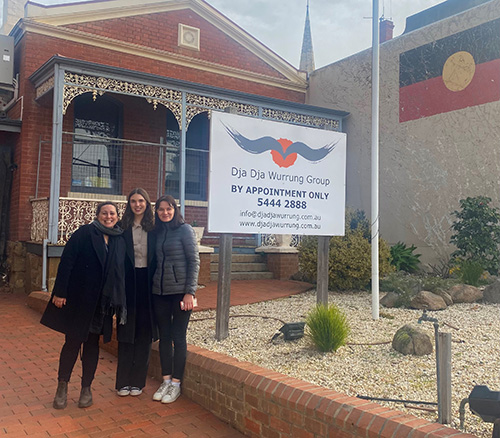
In early 2022 UQ Law Students Sylvia Stuen-Parker, Jessica Nimmo, Millie Collier and Samantha Haran began working on an in-depth research project alongside Dja Dja Wurrung Clans Aboriginal Corporation (trading as DJAARA) following the decision by the High Court of Australia in Northern Territory v Mr A. Griffiths (deceased) and Lorraine Jones on behalf of the Ngaliwurru and Nungali Peoples [2019] HCA 7 ‘Timber Creek High Court Appeal’, commonly known as The Timber Creek decision. The students were mentored throughout the project by academic supervisors Dr Maria Itati Dolhare, Dr William Isdale and Dr Dylan Lino. The research culminated in a detailed report and recommendations. The students hope that the principles-based approach to compensation proposed in the report will provide greater clarity and guidance for future native title claimants seeking redress for their cultural and spiritual losses.
The Timber Creek Decision
On 13 March 2019, the High Court of Australia handed down its first final determination of how native title should be valued and compensated when it is adversely affected or extinguished. In Timber Creek, the Court considered, for the first time, how to calculate an award of compensation under the Native Title Act 1993 (Cth). Importantly, the decision confirmed that compensation should be assessed by reference to both economic (material rights in relation to land) and non-economic (such as spiritual attachment to Country) components of loss suffered by the claimants. The value ascribed to the non-economic loss of the claim group was significant. Importantly, the Timber Creek decision provides some guidance as to how a claim group’s sense of loss of traditional attachment to the land is to be incorporated into the award of compensation. This spiritual aspect, which the High Court referred to as ‘cultural loss’, was deemed to be distinct from the objective economic value of the land.
The High Court’s assessment of non-economic loss
The High Court’s decision in Timber Creek considered the assessment of compensation under the Native Title Act 1993 (Cth) and emphasised that arriving at an amount to compensate for the ‘loss or diminution of traditional attachment to the land or connection to Country and for loss of rights to gain spiritual sustenance from the land’ was an intuitive process. However, in practice, the intuitive, fact-specific approach endorsed by the High Court provides fairly limited guidance for other determinations of compensation for non-economic loss. To help navigate these complexities, the report, researched and written by the students, developed a framework of considerations which were determined to be relevant to the calculation of compensation for non-economic loss. The Timber Creek jurisprudence was vital in identifying the relevant considerations and it helped demonstrate that a formulaic approach would be inappropriate given the highly contextual and personal nature of native title loss. The omission of a clear formula or methodology for quantifying non-economic loss in Timber Creek was highlighted in the discussion that the assessment for compensation was what the ‘Australian community’ would regard as appropriate, fair and just compensation. In the Timber Creek litigation, the High Court agreed with the trial judge’s assessment that $1.3 million would be accepted by the public as appropriate, fair or just.
Throughout its reasoning, the High Court majority emphasised the intrinsically interconnected, spiritual nature of the claim group’s connection to Country, in which “ancestral spirits, the people, the Country, and everything that exists on it are … viewed as one indissoluble whole”. Australia uniquely categorises native title as being comprised of a “bundle of rights” grounded in a particular Claim Group’s traditional laws and customs. Each “bundle” of native title is unique, so what constitutes an appropriate award for non-economic loss will inevitably vary according to “the compensable act, the identity of the native title holders, the native title holders’ connection with the land or waters by their laws and customs and the effect of the compensable acts on that connection”.
Presenting their findings
The full report engaged in detail with the Timber Creek decision and its specific relationship to DJAARA as well as outlining potential ways forward in calculating non-economic, or cultural loss. On completion of the report, Sylvia, Jessica, Samantha and Millie were invited by DJAARA, along with their academic supervisors, to Bendigo in Victoria to present the report and facilitate a discussion with the members of the DJAARA Board. Sylvia, Jessica, and Dr Maria Itati Dolhare were the final team to travel to Bendigo and were joined online by Samantha and Dr William Isdale.
From student Jessica Nimmo to supervisors and Pro Bono Centre:
"Thank you so much for all your hard work on this project. It really paid off. Sylvia and I certainly felt that the Board and DJAARA found the team's work useful. We also had a really wonderful time and are so grateful for the opportunity. We both feel that it will shape the kind of lawyers we will become."
From student Sylvia Stuen-Parker:

"We are so grateful to DJAARA and the Board for entrusting us to do this research, and for generously welcoming us as guests on Dja Dja Wurrung Country. The omission of a clear, furnished formula for compensating non-economic loss in the Timber Creek jurisprudence serves to highlight the inherently irreconcilable nature of ascribing a definable impact or assessable monetary value to the metaphysical, spiritual hurt felt by many native title claimants. This is such a new and emerging area of law in which the views of Aboriginal and Torres Strait Islander peoples are urgently required."
From student Samantha Haran:
"It was such a pleasure to work on this project, and an incredibly unique experience! The research process certainly elucidated for me how truly limited the current law is in its ability to compensate our First Nations people for the incredible violence that is the ongoing colonial project, but it was incredibly inspiring to see the amazing work DJAARA is doing to make important change in this area. And, most of all, I feel extremely grateful to have had the opportunity to contribute something to this vital work that DJAARA is doing."
From Millie Collier:
"Working on this project was absolutely incredible. It was a special opportunity to study a field that is right at the cutting-edge of Native Title law and being able to work with Maria, Will and Dylan and DJAARA was such a privilege. While this was an immensely enjoyable experience, it truly opened my eyes to some of the challenges that Aboriginal and Torres Strait Islander peoples currently face in getting adequate compensation for the loss of culture that they have experienced and has absolutely changed my perspective on the difficulties that our legal system faces. I am so grateful to the Pro Bono Centre and DJAARA for giving us this experience and allowing us to be a part of this important and ongoing conversation."
Sharing their experience working with the students and watching their professionalism, respect and kindness in presenting and leading an interactive activity, their supervisors shared:
Dr Maria Itati Dolhare:
"The trip was fantastic, and the board was incredibly welcoming and very engaged with the excellent work done by the students. It was really nice to meet everyone face to face and the tree activity facilitate some excellent discussions, some of them not the easiest ones, but it was a great learning experience for all of us as non-indigenous researchers. And a massive thanks to the whole team for all their hard work, it has been such a great experience".
Dr William Isdale:
"Congratulations to our students on the excellent presentation, and for so deftly responding to the board's many questions. Many of the questions were not easy to respond to, and I'm very impressed with the way you handled it all. You should also be very proud of your final written report, which is an impressive piece of work."
After the trip to Bendigo, where Sylvia, Jessica and Maria were also invited on Country by the Traditional Owners, our partners at DJAARA shared this about the experience working with the students:
Jim Brooks Executive Team Manager:
"I am probably repeating myself in thanking you for all your support for this project. The input from the students, Maria, Dylan, William and others has been fantastic."
Hannah Webster:
"The quality of the student report went well beyond what we had expected and provided new ideas and opportunities we can take forward in our work.
The trip gave the team a deeper appreciation of the nuances and challenges surrounding native title claims for Aboriginal and Torres Strait Islander people. It also prompted discussions about how the Pro Bono Centre can further assist in this area of law and deepen our commitment to reconciliation."
Congratulations to the students, Jessica, Samantha, Millie and Sylvia and thank you for your unyielding commitment to the project and to seeking change moving forward. Thank you also to Maria, William and Dylan for your mentorship and collaboration throughout the project and the development of the report which was made all the more reach through your insights. Finally, thank you to DJAARA for facilitating this project and the DJAARA Board members who so generously shared their thoughts and experiences with the team.
About the students
Jessica Nimmo recently graduated (July 2022) from the University of Queensland where she studied a Bachelor of Laws (Honours) and Bachelor of Arts degree (majoring in International Relations and Political Science). Jessica was an active member of the Pro Bono Centre's Student Advisory Panel and was nominated as a social justice Leader in 2022.
Millie Collier is a student at the University of Queensland studying a Bachelor of Laws (Honours) and Bachelor of Arts degree majoring in History and Anthropology.
Sylvia Stuen-Parker is a member of the Pro Bono Centre Student Advisory Panel and is a social justice leader mentoring young students interested in supporting access to justice. Sylvia is studying a Bachelor of Laws (Honours) and Bachelor of Arts degree (majors Public Policy and Aboriginal and Torres Strait Islander Studies) at the University of Queensland.
Samantha Haran is styling a Bachelor of Laws (Honours) at the University of Queensland. Samantha is a freelance culture and fashion writer, abolitionist and organiser. Her work predominantly focuses on using fashion as a lens for exploring racism abolition and other socio-cultural issues.



